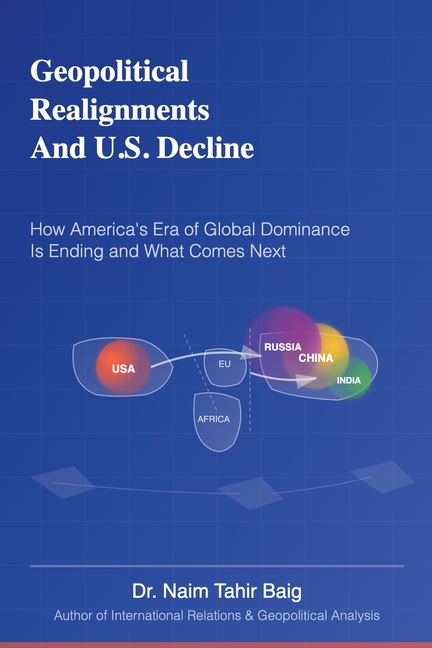Description
BOOK DESCRIPTION
The definitive analysis of America's transition from global hegemon to first among equals in an emerging multipolar world.
In "Geopolitical Realignments and U.S. Decline," Dr. Naim Tahir Baig presents a comprehensive and unflinching examination of the most significant geopolitical transformation of the 21st century: the end of American hegemony and the emergence of a multipolar world order. Drawing on extensive research, current data, and expert analysis, this groundbreaking work traces how the "unipolar moment" proclaimed in 1991 is giving way to a more complex international system where the United States, while remaining the world's most powerful nation, can no longer unilaterally shape global outcomes.
Dr. Baig, a distinguished scholar of international relations, argues that America's relative decline is not the result of policy failures or external attacks, but rather the inevitable consequence of hegemonic success creating the very conditions for competitive multipolarity. Through meticulous analysis of economic indicators, military capabilities, technological competition, and institutional evolution, the book demonstrates how China's rise as a peer competitor, the assertion of middle power independence, and America's own domestic challenges are fundamentally reshaping the global balance of power.
The work goes beyond traditional metrics of national power to examine how technological competition in artificial intelligence and semiconductors, economic decoupling along geopolitical lines, and the emergence of alternative institutional frameworks like BRICS are creating parallel systems that challenge Western-led global governance. Dr. Baig provides a balanced assessment of China's capabilities and limitations, showing why Chinese hegemony is unlikely even as Chinese influence grows, pointing instead toward prolonged strategic competition among multiple great powers.
Uniquely, this book combines rigorous academic analysis with accessible storytelling, featuring behind-the-scenes accounts of key decisions, expert perspectives from around the world, and historical parallels that illuminate contemporary developments. From Pentagon planning sessions to Chinese Politburo deliberations, from European debates over strategic autonomy to middle power hedging strategies, Dr. Baig presents a truly global perspective on the transition underway.
The book concludes with detailed scenarios for possible futures-from managed multipolar competition to dangerous fragmentation-and offers concrete recommendations for American leaders, rising powers, allies, and the international community. Rather than predicting inevitable conflict or decline, Dr. Baig argues that conscious choices made today will determine whether the transition leads to a more stable multipolar order or dangerous instability.
Essential reading for policymakers, business leaders, academics, and informed citizens seeking to understand the changing nature of global power, "Geopolitical Realignments and U.S. Decline" provides the analytical framework necessary for navigating the most consequential geopolitical transition since the end of World War II.
Product Details
- Jul 11, 2025 Pub Date:
- 9798231994472 ISBN-10:
- 9798231994472 ISBN-13:
- English Language




